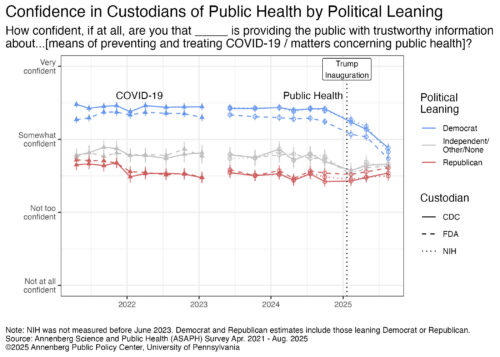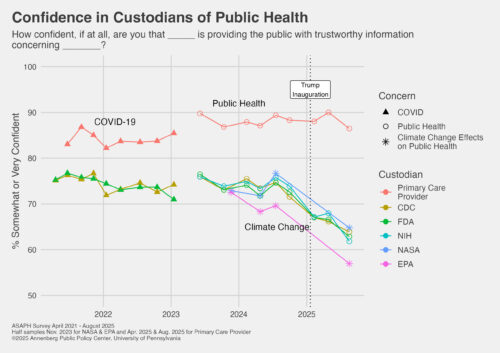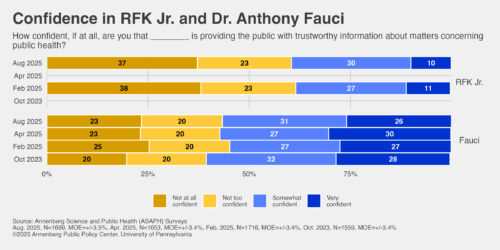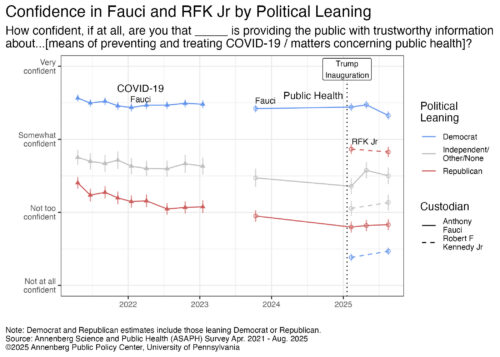Public confidence in the trustworthiness of U.S. health and science agencies has dropped across the board since the inauguration of President Donald Trump, driven by sharp declines among Democrats, according to a new survey by the Annenberg Public Policy Center (APPC) of the University of Pennsylvania.
The survey, conducted Aug. 5-18, 2025, among a nationally representative sample of nearly 1,700 U.S. adults, finds that members of the public have the greatest confidence on health matters in their own primary health care providers, as they have in the past.
Most Americans lack confidence that Health and Human Services (HHS) Secretary Robert F. Kennedy Jr. is providing the public with trustworthy information on matters concerning public health. Just 39% have confidence RFK Jr. is providing trustworthy public health information. By contrast, the public has more confidence (57%) in Dr. Anthony Fauci, the former director of the National Institute of Allergy and Infectious Diseases (NIAID) under Presidents Donald Trump and Joe Biden, even after years of attacks by right-wing critics over his leadership of the U.S. response to the Covid-19 pandemic. [Download the topline.]
Falling confidence in health agencies
The survey finds a broad drop in confidence in U.S. agencies that have historically served as “custodians of knowledge,” in the words of APPC director Kathleen Hall Jamieson, including institutions such as the U.S. Centers for Disease Control and Prevention (CDC), the National Institutes of Health (NIH), and the Food and Drug Administration (FDA), which have helped to explain to the public “what science knows and how it knows it.”
“Although confidence in these agencies remains comparatively high, any drop in confidence, whether warranted or not – during a time when individuals need to make consequential health decisions – is worrisome,” Jamieson said.
The Annenberg survey asked respondents how confident, if at all, they are that the following are “providing the public with trustworthy information about matters concerning public health”:
- CDC: 64% confident, down from 72% in September 2024. Over a third of respondents (36%) are unconfident (combined “not at all” and “not too” confident), up from 28% in September 2024.
- FDA: 63% confident, a 10-point drop from 73% in September 2024. Over a third of respondents (37%) are unconfident, a 10-point rise from September 2024 (27%).
- NIH: 62% confident, a drop from 68% in April this year, and a 12-point drop from 74% in September 2024. The survey finds 38% are unconfident, growing from 32% in April this year and 26% in September 2024.
People had the greatest confidence (86%) in their own “doctor, nurse, or other primary health care provider,” which was statistically unchanged since June 2023.
The survey also asked respondents how confident, if at all, they are that the Environmental Protection Agency (EPA) and National Aeronautics and Space Administration (NASA) are “providing the public with trustworthy information about matters concerning the effects of climate change on public health.” Confidence in both also has declined significantly:
- NASA: 65% confident, down from 77% in July 2024. Over a third (35%) are unconfident, up from 23% in July 2024.
- EPA: 57% confident, down from 70% in July 2024, while 43% are unconfident, up from 30% in July 2024.
Declining confidence of Democrats
Annenberg surveys from mid-2023 to August 2025 show that the confidence of Democrats and Democratic-leaning independents in the trustworthiness of all of these institutions on matters of public health has declined since Trump’s inauguration.
The decline in confidence among Democrats comes amid persistent attacks by leaders in the Republican administration about the competence and integrity of the health agencies. Last year, before becoming HHS Secretary, RFK Jr. called the CDC “a cesspool of corruption,” and he recently testified before Congress about the CDC: “The agency is in trouble and we need to fix it…” In June 2025, Kennedy ousted all the 17 members of the CDC’s Advisory Committee on Immunization Practices, accusing them of conflicts of interest and saying, “A clean sweep is necessary to reestablish public confidence in vaccine science.”
In an earlier period, from April 2021 to January 2023, Annenberg surveys asked whether the public thought that these institutions were providing the public with trustworthy information about the means of preventing and treating Covid-19, rather than public health matters. While in that earlier period, Republican confidence in the CDC and FDA regarding Covid-19 was declining, now it has risen slightly regarding matters of public health. Republicans’ and Republican-leaning independents’ confidence in the CDC and FDA increased significantly since Trump’s inauguration, but those increases are relatively small – they are just a quarter of the Democrats’ and Democrat-leaning independents’ decreases in confidence in those agencies.
 An analysis of the data by party show that:
An analysis of the data by party show that:
- 87%-94% of Democrats and Democratic-leaning independents were somewhat or very confident in the CDC, FDA, and NIH from April 2021 to September 2024. After Trump’s inauguration it dropped significantly compared to September 2024, with 65%-70% of Democrats and Democratic-leaning independents being somewhat or very confident in August 2025.
- 63%-73% of independents were somewhat or very confident in the CDC, FDA, and NIH from April 2021 to September 2024. After Trump’s inauguration it stayed about the same compared to September 2024, with 59%-62% of independents being somewhat or very confident in August 2025.
- 50%-66% of Republicans and Republican-leaning independents were somewhat or very confident in the CDC, FDA, and NIH from April 2021 to September 2024. After Trump’s inauguration it generally stayed about the same compared to September 2024, with 56-61% of Republicans and Republican-leaning independents being somewhat or very confident in August 2025.
Click here for a supplemental topline showing the differences by party before and during Trump’s second term, in September 2024 vs. August 2025.*
Robert F. Kennedy Jr. and Anthony Fauci
Over a third of Americans (39%) have confidence that Kennedy is providing the public with trustworthy information regarding public health, while most of the public (60%) lacks confidence in him, according to the survey. Only 10% are “very confident” in Kennedy, while 37% have no confidence (“not at all confident”) in him.
Confidence in Fauci is 20 points higher: over half of the public (57%) has confidence in former NIAID director Fauci, vs. 43% who are unconfident. Confidence in Fauci, who stepped down from his NIAID post at the end of 2022, is statistically unchanged since October 2023.
An analysis by party, looking at support for RFK Jr. and Fauci, finds that Republican (and Republican-leaners’) support for RFK Jr. is lower than Democratic (and Democrat-leaners’) support for Fauci. Independents are the only group with a significant change this year, increasing their support slightly for RFK Jr.
Annenberg Science and Public Health survey
The survey data come from the 25th wave of a nationally representative panel of 1,699 U.S. adults conducted for the Annenberg Public Policy Center by SSRS, an independent market research company. Most have been empaneled since April 2021. To account for attrition, replenishment samples have been added over time using a random probability sampling design. The most recent replenishment, in September 2024, added 360 respondents to the sample. This wave of the Annenberg Science and Public Health (ASAPH) survey was fielded August 5-18, 2025. The margin of sampling error (MOE) is ± 3.5 percentage points at the 95% confidence level. All figures are rounded to the nearest whole number and may not add to 100%. Combined subcategories may not add to totals in the topline and text due to rounding.
Download the topline and the methods report.
The policy center has been tracking the American public’s knowledge, beliefs, and behaviors regarding vaccination, Covid-19, flu, RSV, and other consequential health issues through this survey panel for four years. In addition to Jamieson, APPC’s ASAPH survey team includes research analyst Laura A. Gibson; Patrick E. Jamieson, director of APPC’s Annenberg Health and Risk Communication Institute; and Ken Winneg, managing director of survey research.
See other recent Annenberg health survey news releases:
- Vaccine mandates for school: Most Americans favor MMR vaccine requirements for public school (September 12, 2025)
- Health risks during pregnancy: Public knowledge high on smoking and alcohol risks during pregnancy (July 29, 2025)
- AI and health information: Many in U.S. consider AI-generated health information useful and reliable (July 14, 2025)
- Sudden infant death syndrome: More people need to know how to prevent SIDS, survey shows (July 1, 2025)
- Mammogram screenings: Survey finds some confusion over mammogram guidelines (June 30, 2025)
The Annenberg Public Policy Center was established in 1993 to educate the public and policy makers about communication’s role in advancing public understanding of political, science, and health issues at the local, state, and federal levels. Connect with us on Facebook, X, Instagram, and Bluesky.
*Updated with additional data Sept. 22, 2025.





